This is a list of dance in China.
| Category | Subtype | Description | Period | Ethnicity | Region | Pictures | |
|---|---|---|---|---|---|---|---|
| Dunhuangwu[1]
(敦煌舞; Dunhuang dance) |
Dunhuang Feitian dance
(敦煌飞天舞) |
Present | |||||
| Thousand hand Guanyin (千手觀音)[2] | 2004 – Present | _-_China-7315.jpg.webp) |
|||||
| Errenzhuan
(二人轉) |
Derived from farmers' dances which were performed to celebrate sowing and planting.
It features folk dance technique of waving fans or silk handkerchiefs.[3] |
Present | Northeast China (Liaoning, Jilin, and Heilongiiang)[3] | ||||
| Guangchangwu
(广场舞; lit. "Square dancing") |
1990s –Present | ||||||
| Huadeng (花燈) | Yunnan flower lantern (云南花灯)[4] | Yunnan | |||||
| Yi people's flower-drum dance | 1898 –Present | Yi | Eshan Yi Autonomous County, Yunnan Province | ||||
| Huagudeng wu
(花鼓灯舞; lit. "Flower drum lantern dance") |
Song –Present[5] | Han Chinese | Huai River Valley (eastern China) | ||||
| Jianwu
(剑舞; lit. "Sword dance")[1] |
Present | Han Chinese |  |
_2.jpg.webp) | |||
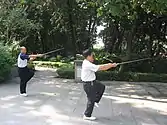 |
|||||||
| Kongquewu
(孔雀舞)[1] |
Dai Peacock dance
(傣族孔雀舞) |
Han –Present | Dai[6] | 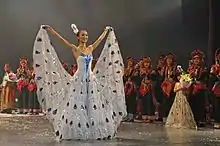 |
|||
| Mukamu[1]
(木卡姆; lit. "Muqam dance") |
Present | Uyghur | |||||
| Sanwu
(伞舞; lit. "Umbrella dance") |
Han[7] –Present |  |
|||||
| Shanziwu
(扇子舞; lit. "Chinese fan dance") |
Han[1] –Present | Han Chinese |  |
||||
| Shuixiuwu
(水袖舞; lit. "Water sleeve dance") |
Zhou –Present | Han Chinese | 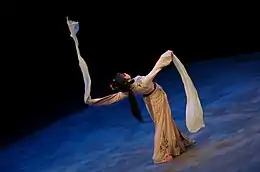 |
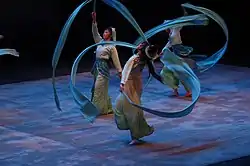 | |||
| Wulong
(舞龙; lit. "Dragon dance") or Long wu (龍舞)[4] |
Han[1] –Present | Han Chinese | 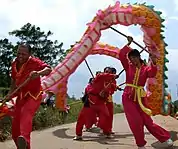 |
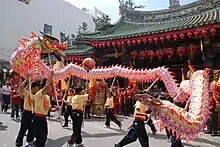 | |||
| Wushi
(舞狮) or Shiziwu (獅子舞) [4] |
Southern Lion dance | Present | Han Chinese | 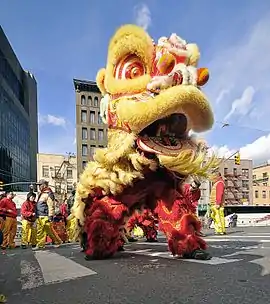 |
|||
| Northern Lion dance | Present |  |
|||||
| Heavenly Tower Lion Dance
(天塔狮舞; Tianta shiwu) |
Present | ||||||
| Tea dance[8] | Tea picking dance (採茶舞; Caicha wu) | Present | Fujian[4] | ||||
| Tea lantern dance | Present | ||||||
| Yangge
(秧歌; lit. 'Rice Sprout Song'); also known as yangko[4] |
Song –Present | Han Chinese[4] | Northern China[4] | 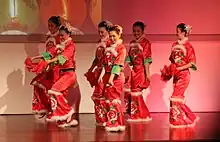 |
|||
| Yangge derivatives | Hongchou wu
(紅綢舞 ; lit. "Red Silk Dance ") |
An iconic dance which shows the combination of Northeast Great Yangge (東北大秧歌; Dongbei da yangge)[4] | 1950s | Han Chinese | Northern China | ||
| Paolü (跑驢; Running Donkey) | Uses techniques of the Hebei Earth Yangge (Hebei di yangge; 河北地秧歌)[4] | 1950s | Han Chinese | Northern China | |||
| Yayue (雅乐, lit "elegant music) | Classical music and dance performed at the royal court and temples in ancient China | Western Zhou | Han Chinese | ||||
See also
References
- 1 2 3 4 5 6 Rechtschaffen, Daniel (2015-12-02). "Mesmerizing Chinese Dances You Should Know". Culture Trip. Retrieved 2021-12-25.
- ↑ The heritage of Chinese culture and dance. Classical dance : Dunhuang. Ming Chen; Sandra Parks; Jake McNeill; Stella Xu; Kennesaw State University. 2016. OCLC 964534193 – via Worldcat.
{{cite book}}: CS1 maint: others (link) - 1 2 "Errenzhuan". en.chinaculture.org. Retrieved 2022-03-04.
- 1 2 3 4 5 6 7 8 9 Wilcox, Emily (2020-03-01). "When Folk Dance Was Radical: Cold War Yangge, World Youth Festivals, and Overseas Chinese Leftist Culture in the 1950s and 1960s". China Perspectives. 1 (2020): 33–42. doi:10.4000/chinaperspectives.9947. ISSN 2070-3449.
- ↑ "The Flower Drum Lantern Is a Traditional Folk Dance Enjoying a Long History-Made-in-China.com". resources.made-in-china.com. Retrieved 2021-12-25.
- ↑ "Peacock Dance". en.chinaculture.org. Retrieved 2021-12-25.
- ↑ "Chinese umbrella dance". learning.hku.hk. 2021.
- ↑ "Tea dance - chinaculture". en.chinaculture.org. Retrieved 2022-03-04.
This article is issued from Wikipedia. The text is licensed under Creative Commons - Attribution - Sharealike. Additional terms may apply for the media files.